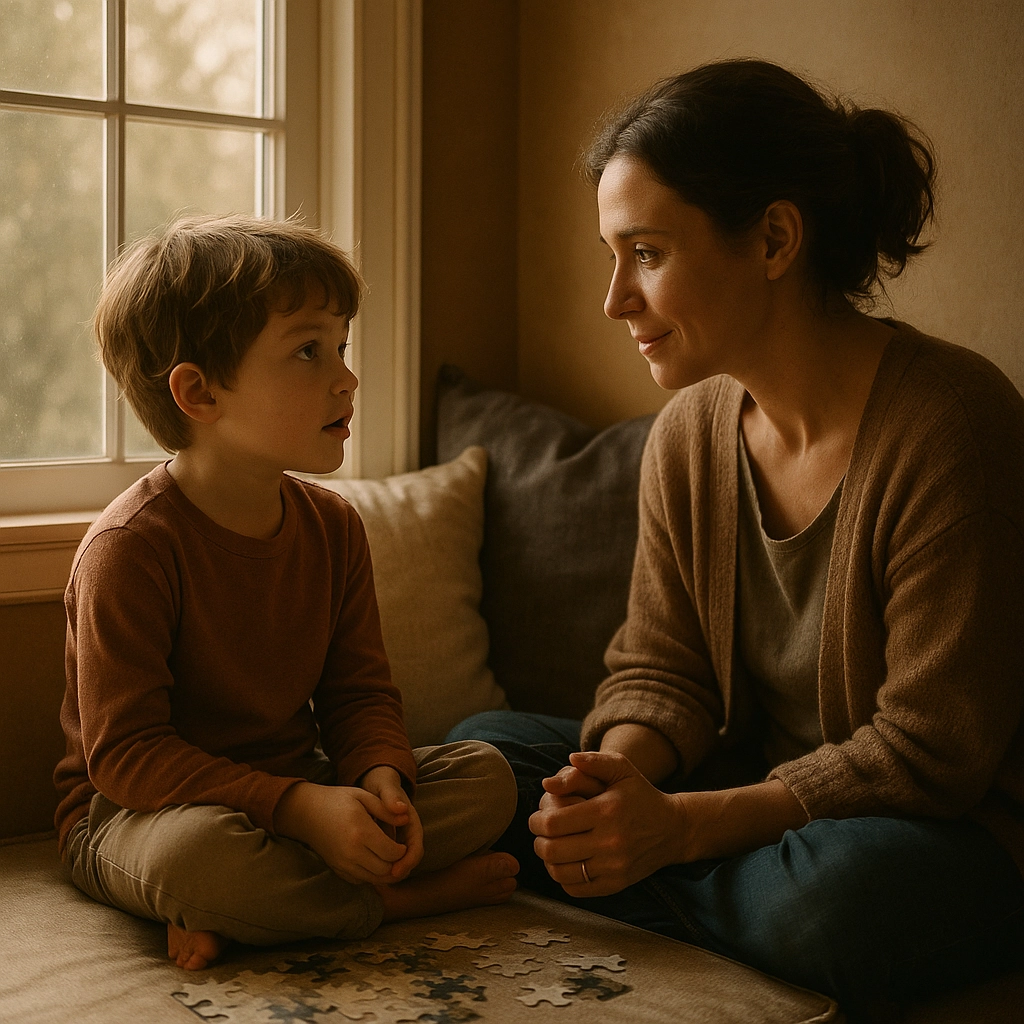Understanding Trauma in Foster Kids: Building Trust, Not Just Routines
- Jennifer Bondank Tripp
- Aug 25, 2025
- 5 min read
When a child enters foster care, they bring with them a backpack full of experiences – many of them painful. As caregivers and support providers at Kids Cove Respite Home, we've learned that while structured routines provide necessary stability, they're just the beginning of healing. The real transformative work happens when we build genuine trust with these children who have often had their trust broken repeatedly.
The Hidden Backpack: Understanding Trauma in Foster Children
Children in foster care have typically experienced significant adversity – from neglect and abuse to witnessing violence or substance abuse. These experiences aren't just bad memories; they fundamentally reshape how a child's brain processes the world around them.
"Trauma" isn't just a clinical term. For foster children, it's lived experience that changes how they respond to everyday situations. A child who has experienced food insecurity might hoard snacks. A child who witnessed domestic violence might flinch at loud noises. A child who was neglected might struggle to believe that any adult will consistently meet their needs.
These reactions aren't behavioral problems – they're survival adaptations that helped the child cope with unpredictable or dangerous environments.

Why Routines Alone Aren't Enough
Many approaches to supporting foster children emphasize establishing clear routines and structures. These are undeniably important – predictable mealtimes, consistent bedtime rituals, and regular schedules help children feel safer by making their world more predictable.
However, routines without relationship can feel mechanical and impersonal. A child may follow a routine perfectly while still feeling fundamentally unsafe emotionally.
Consider this example: A foster child might dutifully follow your household's bedtime routine – taking a bath, brushing teeth, and getting into bed on time – but still lie awake for hours, hypervigilant and unable to relax into sleep. The routine alone didn't address the underlying fear that keeps them alert and on guard.
Building Trust: The Foundation of Healing
Trust is built in small moments over time – and for children who have experienced trauma, this process requires extraordinary patience and consistency. Here's why trust matters more than just maintaining schedules:
1. Trust allows children to relax their vigilance
When children have experienced trauma, their nervous systems remain on high alert. They're constantly scanning for danger, making it difficult to relax, learn, play, or form healthy attachments. When they begin to trust that an adult is safe and reliable, their bodies and brains can gradually shift out of survival mode.
2. Trust creates space for emotional processing
Children who trust their caregivers feel safe enough to express difficult emotions instead of suppressing them. This emotional expression is crucial for processing traumatic experiences.
3. Trust rebuilds internal working models
Children form "internal working models" – mental representations of how relationships work – based on their experiences with caregivers. Traumatic experiences create models like "adults aren't safe" or "my needs don't matter." Consistent, trustworthy relationships help rewrite these models.
Practical Strategies for Building Trust with Traumatized Children
Building trust with children who have experienced trauma requires intentionality and patience. Here are approaches that go beyond maintaining routines:
Be predictable in your responses, not just your schedule
Children who have experienced trauma need to know not just what will happen next, but how you will respond to them in various situations. This means:
Maintaining emotional consistency even when their behavior is challenging
Responding to their needs in reliable ways
Being transparent about what you can and cannot promise
Prioritize connection before correction
When children display challenging behaviors, our instinct is often to correct or discipline immediately. For traumatized children, this approach can reinforce their belief that they are "bad" or that adults are unsafe. Instead:
Connect emotionally before addressing behavior
Validate feelings while setting boundaries on actions ("I understand you're angry, and it's not okay to hit")
Help them identify emotions they may not have words for

Create opportunities for appropriate control and choice
Traumatic experiences often involve a profound loss of control. Offering appropriate choices helps rebuild a sense of agency:
Provide limited, age-appropriate choices throughout the day
Let children have input into routines where possible
Create opportunities for them to experience competence and mastery
Respond to needs beneath behaviors
Challenging behaviors are often communications about unmet needs or triggered trauma responses. Rather than focusing solely on the behavior, ask:
What need might this behavior be expressing?
What might have triggered this response?
How can I address the underlying need while maintaining appropriate boundaries?
Narrate your reliability
Actively point out when you've followed through on promises or maintained consistency. This helps children consciously recognize patterns of trustworthiness they might otherwise miss:
"I said I'd pick you up at 3:00, and here I am, right on time."
"Remember how I told you we'd have spaghetti for dinner? I keep my promises."
"You can count on our special time together every day, just like always."
The Trust-Building Cycle
Building trust with traumatized children isn't linear. The process often follows a pattern:
Testing: The child tests whether you're trustworthy, often through challenging behaviors
Consistency: You respond consistently and compassionately
Small trust: The child begins to trust in specific, limited contexts
Regression: As trust grows, the child may become more vulnerable, triggering fear and retreat
Patience: You maintain consistency despite the regression
Expanded trust: The child gradually expands their trust as they experience continued safety
This cycle may repeat many times as trust expands into different areas of your relationship with the child.

How Respite Care Supports Trust-Building
At Kids Cove Respite Home, we understand that trust-building isn't just important for primary foster parents—it's crucial across all relationships in a child's life. Our respite care program is designed to:
Maintain consistency with children's primary households
Provide trained caregivers who understand trauma and trust-building
Offer a predictable, nurturing environment where children feel emotionally safe
Support primary foster families so they can maintain their own emotional resources for trust-building
As one foster parent shared after using our services: "The consistency between our home and Kids Cove made all the difference. Our child didn't have to 'reset' their sense of safety when they returned home."
The Long View: Trust as a Healing Force
Building trust with traumatized children isn't quick or easy. It requires sustained effort, patience, and resilience through setbacks. But the impact is profound and lasting.
When children begin to trust, we see remarkable changes:
Reduced anxiety and hypervigilance
Improved ability to regulate emotions
Greater capacity for meaningful relationships
Enhanced learning and development
Increased resilience in the face of future challenges
These changes don't just improve a child's experience in foster care—they create the foundation for healthier relationships throughout their lives.
Taking the Next Step
Understanding trauma and building trust with foster children requires support, education, and community. If you're caring for a child who has experienced trauma, remember that you're not alone in this journey.
At Kids Cove Respite Home, we're committed to supporting foster families through quality respite care and educational resources. Whether you need a scheduled break to recharge your own emotional batteries or guidance on building trust with your foster child, we're here to help.
Learn more about our approach to trauma-informed respite care or contact us to discover how our services can support your family's healing journey.
Remember, every small moment of trustworthiness plants a seed of healing. With patience and persistence, those seeds grow into life-changing relationships that can help a child rewrite their story.

Comments